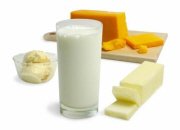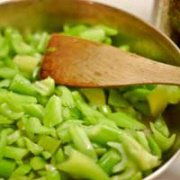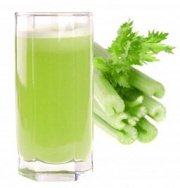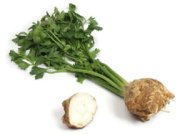Celery Nutrition Facts
Celery Nutrition Facts Information
Celery is also known as celeriac. This depends on whether the leafy stalks or roots are being consumed also. Both the stalks and the root have some minerals, nutrients and vitamins that re beneficial to our bodies. These include Vitamins A, C, K, Iron, Calcium, Potassium, Dietary Fiber, Folate and Riboflavin just to name a few. All these each have an important role they play in our bodies.
The vegetable celery has different uses as well. Apart from the usual of it being used as part of a meal, in salads, as a side dish or in juice form, celery (the seeds) is also used as a spice or flavoring. Celery salt is either made by combining the seeds with salt or from an extract from the celery root.
Celery Nutrition Facts Health Benefits

Celery is one vegetable that has been used in many weight loss diets. However, celery is a very good vegetable for the heart. This is because it has nutrients, vitamins and minerals that all help in promoting the good health of your heart as well as help to prevent heart disease. These include Potassium, Vitamin C, Magnesium and Calcium. We will take brief look at each of them.
Potassium amongst many other things helps to regulate blood pressure and the functioning of the heart. High blood pressure, also known as hypertension, can lead to heart disease or even heart failure. Therefore this is one mineral that you want to add to your healthy eating diet, whether you are hypertensive or not. Other food sources of potassium include bananas, tomatoes and boiled soya beans just to name a few.
Magnesium is one mineral that has been found to be important in maintaining a healthy heart. It does this by preventing abnormal blood clotting in the heart as well as stabilizing the rhythm of the heart. This mineral is said to have the ability to aid in preventing the risk of strokes and heart attacks. In fact, research has shown that it can even help in the recovery from the two conditions we've just mentioned. You may also get a good amount of magnesium from green leafy vegetables such as spinach and some legumes such as beans and nuts.

Some doctors after research have discovered that calcium may actually be as important as sodium in reference to blood pressure, although in slightly different ways. Too much sodium in your system may causes you blood pressure to shoot, making you hypertensive. On the other hand, too little calcium in your system may actually also increase your blood pressure.This is due to certain hormones that are released into your system in reaction to the low calcium detected. It has also been shown that a sufficient amount of calcium in your body may help your heart muscles to contract and relax and the right times. The Dietary Approaches to Stop Hypertension (DASH) confirmed the heart health benefits of calcium more than a decade ago, in 1997. More sources of calcium as we already know are dairy products such as milk, cheeses and yogurt, spinach and oranges.
Finally, Vitamin C is widely known for it's ability to boost our immune system. However, it has also been found to be beneficial to our hearts. One of the ways in which it does this is by protecting LDL cholesterol (the good cholesterol) in our blood stream from free radicals. Vitamin C can do this because it's an antioxidants and antioxidants fight against free radicals. When LDL cholesterol cells are attacked and destroyed by free radicals chances are very high that they will stick to the walls of the arteries which will eventually cause the walls of the arteries to be clogged. This is known as arteriosclerosis. When this happens, a stroke, heart disease or heart attack is inevitable. Vitamin C can also be found in citrus fruits, mangoes, broccoli, strawberries and green peppers just to name a few.
Celery Nutrition Facts Raw
We will base this nutritional information on the Nutrition Labeling and Education Act (NLEA). This is basically the amount of food that one would normally consume in one sitting. The nutrition facts below and those that shall follow are based on a 2,000 calorie diet. Your percentage daily values may differ depending on your calorie needs.

- Serving size- 110g
- Calories- 18
- Calories from Fat- 2
- Total Fat- 0g
- Saturated Fat- 0g
- Cholesterol- 0mg
- Sodium- 88mg, 4% of DV
- Total Carbohydrate- 4g, 1% of DV
- Dietary Fiber- 2g, 7% of DV
- Sugars- 2g
- Protein- 1g
- Vitamin A- 10% of DV
- Vitamin C- 6% of DV
- Calcium- 4% of DV
- Iron- 1% of DV
- Vitamin K- 40% of DV
- Folate- 10% of DV
Cooked Celery Nutrition Facts
These are nutrition facts of celery that is cooked by being boiled then drained and has salt added to it. It's important that when we cook vegetables we don't overcook them as this may lead to us losing the nutrients, minerals and vitamins that we need from them. Cooked celery nutrition facts are a good source of Vitamins A and C and an excellent source of Vitamin K. Vitamin K is good for regulating blood clotting as well as help prevent blood loss when one is injured amongst many other functions.

- Serving size- 1 cup diced (150g)
- Calories- 27
- Calories from Fat- 2
- Total Fat- 0g
- Saturated Fat- 0g
- Cholesterol- 0mg
- Sodium- 491, 20% of DV
- Total Carbohydrate- 6g, 2% of DV
- Dietary Fiber- 2g, 8% of DV
- Sugars- 4g
- Protein- 1g
- Vitamin A- 16% of DV
- Vitamin C- 15% of DV
- Calcium- 6% of DV
- Iron- 4% of DV
- Vitamin K- 71% of DV
- Folate- 8% of DV
Celery Nutrition Facts Juice
Celery juice is one vegetable juice that has been found to have many health benefits including having an anti-inflammatory effect. Hence it can also be used to help in healing gout, bronchitis or even osteoarthritis. These nutrition facts show us that it is a very good source of vitamin C. It is a good source of dietary fiber and calcium and a source of iron. Another good thing about this juice is that it contains very little fat and sodium.

- Serving size- 1 cup
- Calories- 42
- Calories from Fat- 3
- Total Fat- 0.38g, 1% of DV
- Saturated Fat- 0.1g, 0% of DV
- Polyunsaturated Fat- 0.2g
- Mono-saturated Fat- 0.1g
- Cholesterol- 0mg
- Sodium- 215mg, 9% of DV
- Potassium- 670mg
- Total Carbohydrate- 9.5g, 3% of DV
- Dietary Fiber- 4g, 16% of DV
- Sugars- 5.6g
- Protein- 2g
- Vitamin A- 0% of DV
- Vitamin C- 24% of DV
- Calcium- 10% of DV
- Iron- 6% of DV
Cream of Celery Nutrition Facts
These are nutrition facts for cream of celery soup that is canned prepared with an equal volume of milk. From this information we can see that it is a source of Vitamins A and C, Iron and Dietary Fiber. It is a good source of Calcium and Riboflavin. However, the sodium, cholesterol and saturated fat content is rather high. Too much of these in our system can be detrimental to our health.

- Serving size- 1 cup (8 fl oz/250ml)
- Calories- 164
- Calories from Fat- 85
- Total Fat- 10g, 15% of DV
- Saturated Fat- 4g, 20% of DV
- Cholesterol- 32mg, 11% of DV
- Sodium- 1009mg, 42% of DV
- Total Carbohydrate- 15g, 5% of DV
- Dietary Fiber- 1g, 4% of DV
- Protein- 6g
- Vitamin A- 9% of DV
- Vitamin C- 2% of DV
- Calcium- 19% of DV
- Iron- 4% of DV
- Riboflavin- 15% of DV
Celery Nutrition Facts Root
The Celery root nutrition facts show us that it is a good source of Vitamin C which amongst many other things helps to boost our immune system and aid it to fight against diseases and infections that may want to attack our bodies. It is a source of dietary fiber which aids in digestion, as well as calcium which promotes the development of strong bones and teeth. It's also a source of iron which helps in the formation of haemoglobin in the blood amongst many other things.

- Serving size- 1 serving, raw (100g)
- Calories- 40
- Sodium- 100mg, 4% of DV
- Total Carbohydrates- 9g, 3% of DV
- Dietary Fiber- 2g, 8% of DV
- Sugars- 2g
- Protein- 2g
- Vitamin A- 0% of DV
- Vitamin C- 15% of DV
- Calcium- 4% of DV
- Iron- 4% of DV
Now that we know the celery nutrition facts and we see the variety of nutrients, minerals and vitamins it supplies our bodies, we will gladly have some. Whether it's in juice , soup, salad form or just plain. Unless if you fall into the group of people who are allergic to it. There still are a number of vegetables and fruits that you may include in your diet.


